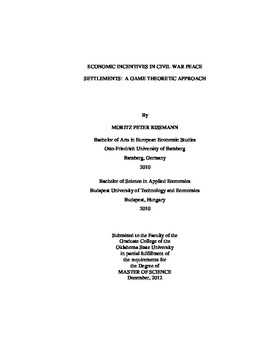| dc.contributor.advisor | Emmanuel, Nikolas G. | |
| dc.contributor.author | Rissmann, Moritz Peter | |
| dc.date.accessioned | 2014-04-15T22:32:48Z | |
| dc.date.available | 2014-04-15T22:32:48Z | |
| dc.date.issued | 2012-12-01 | |
| dc.identifier.uri | https://hdl.handle.net/11244/9612 | |
| dc.description.abstract | Subjects generate income by investing in productive activities or appropriation. Conflict is always pareto-inferior to peace. Malevolent preferences, disharmonious consumption, asymmetric information, and weak institutions lead the parties into a conflict trap. This study finds that third-party economic intervention in conflicts can overcome the constraints of scarce resources, reverse the incentives for fighting, and shift the decision making process towards higher social welfare levels which lay beyond violent outcomes of the bargaining process. Intervening parties have to complement the current toolset of coercive and noncoercive measures with economic development and state building. The models of conflict suggest that for some players, appropriation yields more profit than regular production. Without guaranteed independent authorities the players are better off defending themselves. Given expectations about the future, players may decide for war even when peace yields higher immediate benefits. Players will not disarm unless they can be sure that their security needs will be satisfied in the future. Even without a common government and disarmament, opposing parties can reach a peaceful equilibrium: At some point the costs of war outweigh the payoff. If the payoff of a civil war, e.g. rights, is a public good, individuals have no incentive to join the fight unless they are offered immediate personal advantages. Investments in a civil war economy have to be targeted. Increasing the productivity of land in a territory-based conflict is deconstructive. Conflicts are continuous games in which outcomes alternate between war and peace. Peace settlements are not final and will need renegotiations. | |
| dc.format | application/pdf | |
| dc.language | en_US | |
| dc.publisher | Oklahoma State University | |
| dc.rights | Copyright is held by the author who has granted the Oklahoma State University Library the non-exclusive right to share this material in its institutional repository. Contact Digital Library Services at lib-dls@okstate.edu or 405-744-9161 for the permission policy on the use, reproduction or distribution of this material. | |
| dc.title | Economic Incentives in Civil War Peace Settlements: a Game Theoretic Approach | |
| dc.type | text | |
| dc.contributor.committeeMember | Jenswold, Joel | |
| dc.contributor.committeeMember | Phillips, Brenda | |
| osu.filename | Rissmann_okstate_0664M_12458.pdf | |
| osu.college | Arts and Sciences | |
| osu.accesstype | Open Access | |
| dc.description.department | Political Science | |
| dc.type.genre | Thesis | |
| dc.subject.keywords | civil war | |
| dc.subject.keywords | economic incentives | |
| dc.subject.keywords | incentive-based intervention | |
| dc.subject.keywords | peace settlement | |
| dc.subject.keywords | violent intrastate conflict | |
